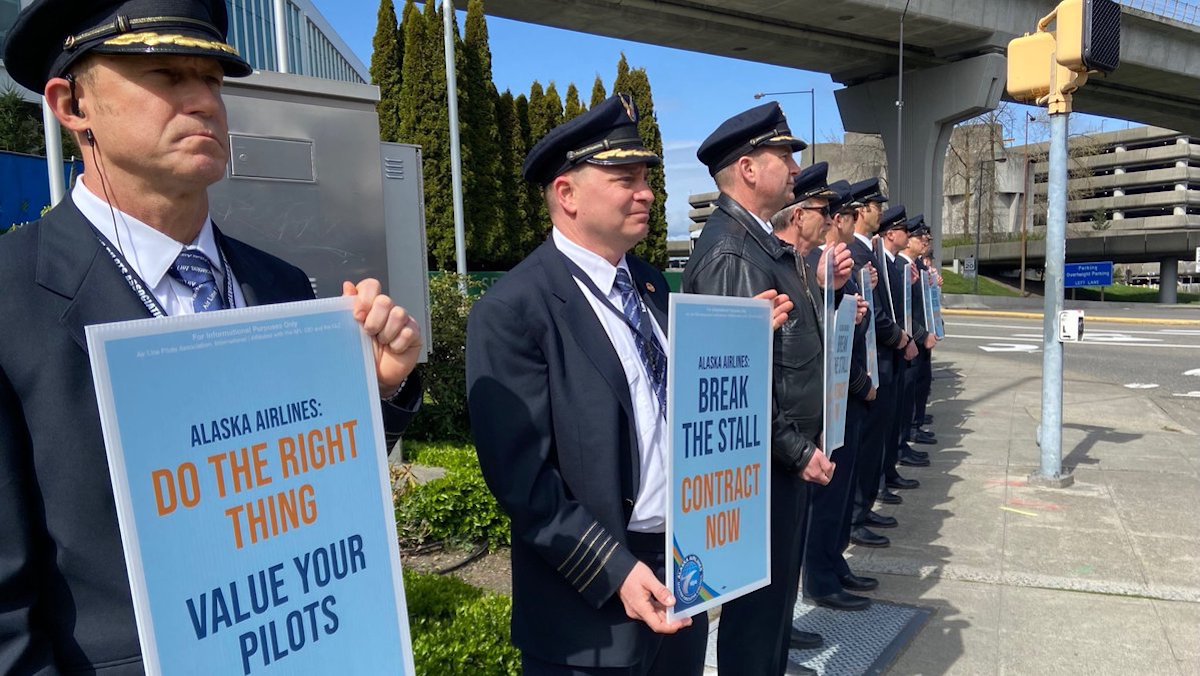
Alaska Airlines stranded thousands of passengers Friday after coming up short on staffing during the busy spring break travel period. Concurrently, off-duty pilots picketed in a growing impasse between management and pilots over pay and benefits.
Alaska Airlines Cancels Flights In Growing Struggle With Pilots Over Contract
On Friday, Alaska Airlines cancelled 111 flights, 15% of its flight schedule, and delayed 104 flights, 14% of its flight schedule. This morning, Alaska has cancelled 76 flights, 10% of its schedule.
Meanwhile, hundreds of pilots rallied at airports including Seattle, Portland, Anchorage, Los Angeles, and San Francisco over what the Air Lines Pilots Association (ALPA) calls a fight for fairness.
“Alaska Airlines failed to properly plan for increased travel demand and take the steps necessary to ensure it attracted and retained pilot…
“Now, they’re trying to distract the public from their mismanagement and blame the pilots who helped save their company. Pilot leaders have been warning for years that pilots will choose to fly for other airlines due to an inadequate contract that will only exacerbate existing staffing challenges.”
The problem was not a strike or even an unofficial wildcat strike: the picketing was performed by off-duty pilots. Instead, the more likely reason for the flight cancellations was that Alaska’s schedule was simply too ambitious, leaving the carrier with little room for error. Without a deeper pool of reserves, routine cancellations by pilots for sickness or injury resulted in an inability to staff flights, creating a ripple effect of delays and cancellations.
Like many sectors, the airline industry depends upon employees to put in overtime. Pilots can volunteer to serve more hours and it appears, perhaps because they were picketing, that not as many stepped up as Alaska had planned for, a union bargaining tactic does not violate the Railway Labor Act but can achieve a similar effect to a strike.
An Alaska Airlines spokesperson noted:
“It takes everyone at Alaska to run a successful and reliable operation. We’re grateful for all employees who are working hard to get our guests to where they need to go…
“A new pilot contract remains a top priority for Alaska. We’ve put a package on the table that’s competitive and addresses the issues most important to our pilots.”
ALPA Chairman for Alaska Airlines, Captain Jeff Schroeder, did state that an official strike is currently not on the table:
“For now, our main thrust is to get a contract as soon as we can. We’re not interested in a strike unless it becomes necessary.”
Picketing will continue…flight cancellations likely will as well.
CONCLUSION
Alaska Airlines has stranded thousands of passengers due to staffing issues intertwined with pilot unrest over the lack of a new contract. With both sides still seemingly far apart, passengers can expect to feel the consequences in the weeks ahead.
image: ALPA




If you listen to the Alaska pilot podcast, they’re even more delusional.
How can you conclude that there is not a sick-out and informal effort not to accept extra flights? This came on extremely suddenly. It’s almost certainly a labor action.
If there had been a sick out you’d know it easily. First those kinds of coordinated efforts never happen secretly. Second the impact of a mass sickout or refusal to fly open time would likely have been significantly greater. Third companies have never hesitated to sue unions when they had any evidence of an illegal job action.
The interesting thing of course is that a pilot group that is truly unified and determined could bring a company to its knees no matter what a judge orders. But that degree of unity is something I’ve never seen in the industry.
Anti union information bias in 5,4,3,2…